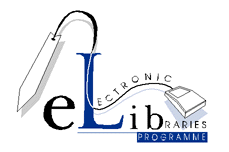CATRIONA II: Approaches to University Management of Electronic Resources
- Project web site
-
http://catriona2.lib.strath.ac.uk/catriona/
- Programme area
-
Access to Network Resources
- Contact details
-
Mr Dennis Nicholson, Head of Library Systems,
Strathclyde University Library 101 St. James Road Glasgow G4 0NS
Phone: 0141 552 3701 Fax: 0141 552 3304
Email: d.m.nicholson@strath.ac.ukProf. Iain MacLeod,
Dept. of Civil Engineering Strathclyde University John Anderson Building Glasgow G4 0NS
Phone: 0141 552 4400 Fax: 0141 552 2206
Email: i.a.macleod@strath.ac.uk
Project description
as of 24th July 1996
Introduction
The CATRIONA II project is an investigation of approaches to the management and creation of institutional and departmental electronic resources in Scottish universities; of the existence of quality, locally-created, electronic resources on individual campuses and their value both within and beyond the local institution; of intentions regarding the provision of campus-wide and external access to such resources; and of associated questions relating to institutional policy, strategy, organisational infrastructure, and approaches to resource delivery and maintenance, with particular reference to the role of the library. A subsidiary aim would be to establish guidelines for best practice in these areas.Description
The project will look at organisational issues rather than technical or operational requirements. The aim will be to examine whether institutions will consider it worthwhile to manage electronic resources for internal and external purposes (and to encourage their creation), if and how they will do this, which agencies will be involved and in what fashion. Associated issues such as resource description, discovery, delivery, maintenance, archiving, departmental and institutional hardware, software and networking environments, will be investigated only as necessary in order to inform discussions and decision-making regarding policy, strategy, organisational infrastructure, and sub-institutional or extra-institutional roles.Investigations will focus primarily on the two lead institutions, Strathclyde University and Napier University, but will also extend to encompass the rest of Scotland and a UK context will also be taken into consideration. A parallel investigation will take place into the current position as regards the existence and accessibility of electronic resources at the lead institutions and across Scotland.
Two different organisational models will be examined in detail. One, at Strathclyde, in which the Library participates as an equal partner with other departments, using its specialist skills as appropriate to advise, promote the use of standards or, at least, a consistent approach, to such things as layout, cataloguing, support for search interfaces, and (perhaps) take a training role. The other model, at Napier, in which the Library plays a central role, with the assistance of the Computer Services Unit, in identifying, collecting and organising the resources in consultation with the University's Central Executive Group and Departmental information providers. The possibility that the best model might include elements of both and, indeed, of other Scottish institutions, will be considered.
The project will take place in the context of two differing approaches to the provision of access to e-resources across campus: at Napier, based on a single central service run by the Library. At Strathclyde, based on a distributed service, involving a number of approaches to resource description, discovery, delivery, archiving and maintenance.
Strathclyde University
The Computer Centre runs a Campus Wide Information Service (CWIS) for the University with WWW, Gopher and ftp servers. Some departments have resources on the central server, others run their own servers with links from the central server. The Library is in the process of installing a new Library System. As part of this process it will make available to all campus users Z39.50 OPAC clients for MS Windows, X-Windows and Apple GUI environments. These will allow electronic resources catalogued in Z39.50 OPAC servers to be delivered to the desktop. (Netscape or a similar client is automatically loaded in response to a URL (Uniform Resource Locator) in a catalogue record and the URL automatically passed to it.) At the same time, three Library-based Z39.50 OPAC servers will be gradually adding catalogue records covering significant electronic resources (BUBL LINK Server, Library Resources Server and Library OPAC).Napier University
Napier University Library is currently developing a CWIS for Napier University. The Library's strategic plan indicates that part of the CWIS will include access to full-text, etc., machine-readable versions of teaching packages, lecture notes, and research materials produced by Napier staff. The CWIS is based on WWW/HTML technologies and is not currently Z39.50 compliant. The Library wishes to upgrade its Library Management System within the next two years, and a Z39.50 server to access the catalogue will be a requirement of the new system.Participants
The two institutions leading the project are Strathclyde University and Napier University. The Scotland-wide aspects of the study will also entail the involvement of SCURL (Scottish University and Research Libraries).Deliverables
The main project outcome will be a report covering both the existence of quality electronic resources on Scottish campuses and the results of project investigations regarding approaches to the management and creation of such resources. If appropriate, the report will include guidelines for best practice in some or all of the areas investigated. It will also provide institutions with a series of questions to consider when setting out to examine these matters and may comment on whether or not the research might be further extended or developed.Other deliverables will include a significant increase of knowledge and experience regarding these issues within the lead institutions in particular and Scottish institutions in general.

